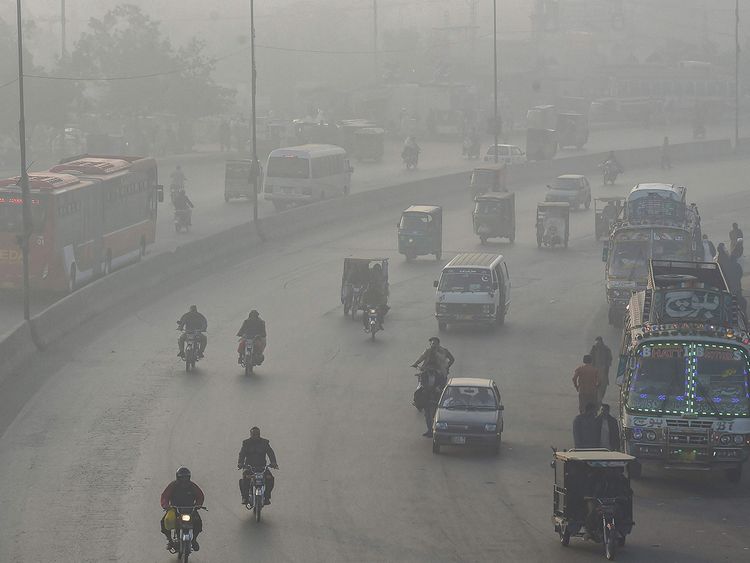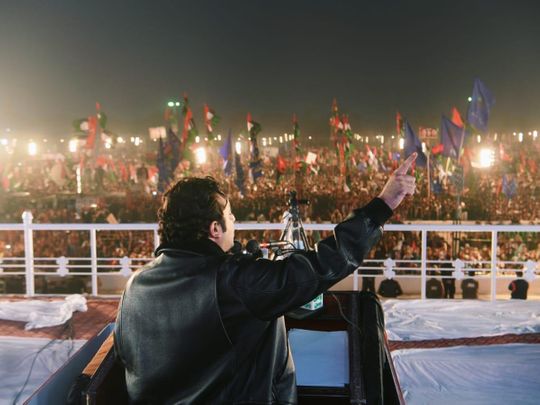M WAQAR..... "A man's ethical behavior should be based effectually on sympathy, education, and social ties; no religious basis is necessary.Man would indeed be in a poor way if he had to be restrained by fear of punishment and hope of reward after death." --Albert Einstein !!! NEWS,ARTICLES,EDITORIALS,MUSIC... Ze chi pe mayeen yum da agha pukhtunistan de.....(Liberal,Progressive,Secular World.)''Secularism is not against religion; it is the message of humanity.'' تل ده وی پثتونستآن
Saturday, January 1, 2022
Video Report - Eric Adams is Sworn in as 110th Mayor of New York City
Mr. Adams, the city’s second Black mayor, faces difficult decisions over how to lead New Yorkers through the next wave of the pandemic.
Militant attacks rise in Pakistan after Taliban offensive in Afghanistan: report
#Pakistan - Opposition demands PM Imran Khan's resignation after govt drops 'petrol bomb'
The Opposition said Saturday it would have been better if Prime Minister Imran Khan resigned from his office rather than ringing in the New Year by dropping a "petrol bomb" on the Pakistani nation.
In separate statements, PPP Chairman Bilawal Bhutto-Zardari and Leader of the Opposition in the National Assembly and PML-N President Shahbaz Sharif criticised the government's decision of moving up the price of petroleum products.
"Governments across the world celebrate festive occasions by bringing down prices, but on the contrary, Imran Niazi has dropped an inflation bomb on the masses," he said.
The PML-N president asked the prime minister to step down instead of "punishing" the masses due to his "incompetency".
Shahbaz hoped that the new year would rid the masses of inflation, economic disruption, hunger, diseases, and injustice.
For his part, Bilawal said the increase in prices of petroleum products was Imran Khan's New Year's gift to the citizens and the only way to end inflation is to oust PTI's government.
“Imran Khan claimed that 2021 would be the year of prosperity, but 2022 has arrived, where have the claims gone,” asked the PPP chairman.
He stated that the country witnessed higher inflation than a year prior during the PTI's tenure, but they continue to blame previous governments and try to portray them as incompetent.
Bilawal claimed that the PPP faced the worst economic crisis in the world's history but did not let the citizens bear the brunt of the inflation.
He urged the federal government to reduce the rates of petroleum products in line with international prices.
The PPP chairperson stated that the only way to end inflation is to "oust Imran Khan."
Pakistan rings in the new year with Rs4 hike in petrol price
On the eve of the new year, the federal government announced yet another hike in the prices of petroleum products.
According to a notification issued by the Finance Division on Friday, the price of petrol and high-speed diesel(HSD) will rise by Rs4 per litre for the first 15 days of January 2022.
The new prices would come into effect from January 1.
The increase has been announced to meet the petroleum levy target agreed with the International Monetary Fund (IMF).
As per the notification, the price of kerosene has been increased by Rs3.95, and light diesel oil (LDO) by Rs4.15 per litre.
https://www.geo.tv/latest/390923-petrol-price-hike-imran-khans-new-year-gift-to-pakistanis-bilawal-bhutto
Smog-choked Pakistanis demand urgent action on air pollution from PM
Lahore has repeatedly topped its ranking as the most polluted city in the world.
Lahore has repeatedly topped ranking as the most polluted city in the world since last month. Pollution and smog are making people sick, disrupting everyday life. The air quality levels (AQI) in the city had remained hazardous and unhealthy for the whole of November and December, according to IQ Air monitoring platform.
“My children frequently experience breathing and coughing issues because of this killer smog. I feel like there’s no option but to leave this city” Sarah Rashid, a resident of Lahore, told Gulf News. But not everyone can afford to leave the megacity of more than 11 million people.
Citizens appeal to PM to take action
To make the city livable, some concerned citizens are making every effort such as installing air quality monitoring devices and judicial activism to compel Punjab authorities to take action. Dismayed by the response of the provincial government, a group of young climate activists and experts took their desperate appeal to the front page of mainstream newspapers with a half-page ad titled “Air Apocalypse, mask-clad Lahore looks for answers.”
They appealed to Prime Minister Imran Khan to take immediate actions and implement policies to improve air quality following the letdown by the Punjab government that resulted in toxic air in and around Lahore.
“We need urgent action”
Environmental lawyer Ahmad Rafay Alam who has been campaigning for clean air since 2016 told Gulf News that the concerned citizens of Lahore are making every effort to raise alarms about air pollution. “This massive public health crisis cannot be avoided anymore,” he said. PM Imran Khan’s Pakistan Tehreek-e-Insaf (PTI) is the country’s first political party to include green agenda on its manifesto.
But the climate activists say that policies on air pollution have been “all talk and no action.” Alam says that sealing the factories and arresting the violators is “not enough” action. “What I care about is actual improvement in quality of air that we breathe.” He urged the government to focus on “science-based policy” to gradually improve air quality. “We need urgent action.”
• Shift from coal and gas power stations and diesel generators to renewables such as solar, wind and hydropower.
• Replace diesel and gasoline-powered vehicles with electric vehicles through a mix of policies such as subsidies.
• Stricter standards for vehicle emissions and fuel quality control in trucks, buses, cars, bikes, rickshaws and chingchi. Move up to Euro V standards to remove air pollution and CO2 levels.
• Preventing crop burning and switching to the latest technologies.
• Focus on awareness and capacity building of key sectors such as transport, agriculture, industries, urban waste management.
• Create green spaces in cities and prioritise walking, cycling and public transport over cars in urban areas
• Strengthen environmental governance and promote green investments.
What causes air pollution in Lahore?
The main sources of air pollution in Lahore are vehicle and industrial emissions, smoke from brick kilns, the burning of crop residue and general waste, and dust from construction sites. The air quality in Lahore is bad throughout the year but people only realise it in winter months when warm air traps all the pollutants leading to low visibility, inter-city traffic disruption and frequent health issues.
Major public health crisis
The problem is worsening in Lahore in the populous Punjab province but the situation in other major cities such as the coastal city of Karachi is not better either. Pakistan is the world’s fourth most polluted country where air pollution shortens the average life expectancy by 4.3 years, according to Air Quality Life Index.
The provincial Environment Protection Department is tracking and reporting air quality data but some experts claim that the data is unreliable which leads to downplaying the severity of the issue. However, a community-driven effort has been launched by the citizens under Pakistan Air Quality Initiative (PAQI) to monitor air quality data by installing 50 monitors across Pakistan, including 30 in Lahore.
Measures taken by government
Climate Change Minister Malik Amin Aslam in a recent interview said that the government is taking significant steps to curb air pollution. These measures include installing more monitoring devices, shifting to fuel-efficient brick kilns, curbing open crop stubble by replacing it with happy seeder machines, moving up to Euro V standards to reduce vehicle emissions, launching vehicular fitness testing, and introducing electric cars and electric buses in public transportation.
Pakistan needs “drastic steps or the cities would become unlivable” Aslam warned. “We need to create livable zones and pedestrian zones, increase the use of public transport, and also introduce congestion charges at peak times,” he said, citing the example of city of London where congestion fees led to some reduction in traffic jams and pollution. He also called for a regional framework to control the transboundary pollution flow as crop fires from India sweep into Pakistan, worsening the situation.
Recommendations
Experts have suggested that Pakistan should learn lessons from China which made tremendous progress by declaring a war against pollution in the last decade, cutting its particulate pollution by about 30 per cent and improving life expectancy.
https://gulfnews.com/world/asia/pakistan/smog-choked-pakistanis-demand-urgent-action-on-air-pollution-from-pm-1.1641050955790
#Pakistan #PPP - Bilawal announces decisive anti-government campaign from Lahore on January 5
Announcement made at huge gathering to mark 14th death anniversary of his mother Benazir.
The Chairman of the Pakistan Peoples Party (PPP), Bilawal Bhutto Zardari, has announced the party will launch a decisive agitation from Lahore on January 5 to get rid of the present government of Pakistan Tehreek-e-Insaf in the country. The PPP Chairman made the announcement while addressing a massive public gathering in Garhi Khuda Bakhsh, Larkana, which was held to mark the 14th death anniversary of his mother and former prime minister Benazir Bhutto. “We will now be based in Lahore as the campaign to get rid of the present government will start from the same city where our [political party] was established,” said Bilawal. He said for the same purpose, a meeting of the central executive committee of the PPP will be held in Lahore on January 5 - which is also the birthday of the founder of the party and former PM Zulfikar Ali Bhutto, who was hanged by the military government of Pakistan in 1979. He mentioned that the Opposition had defeated the ruling party in the recently held by-elections, Senate, and local government elections in the country. He predicted that the next PM and chief ministers of the provinces after forthcoming general elections in the country would belong to the Peoples Party. Federalism, principle of equality, and Islam Bilawal said the PPP had always believed in power of the masses as its politics in Pakistan always stood for federalism, principle of equality, and Islam. He said the PPP had never attempted to seek any undemocratic mean to strike a deal with anyone to come to power. The PPP Chairman said he had plans to visit areas in every province of Pakistan to spread the message of late leaders of the party, Zulfikar Ali Bhutto and Benazir Bhutto. He said the top leaders of the PPP, including himself, former president Asif Ali Zardari, Faryal Talpur, and Aseefa Bhutto Zardari, would go to each part of the country for the purpose.
He recalled that the former PPP-led federal government had come to power when there had been global economic recession but even then, the Party’s regime had been able to stabilise the national economy while projects like the Benazir Income Support Programme, China Pakistan Economic Corridor, and Pakistan-Iran gas pipeline were launched. He lamented that the high taxation rate, unprecedented hike in the prices of essential commodities, increasing unemployment, and poverty during the present regime had made labourers, farmers, and middle-income families in the country suffer. Bilawal declared that only the manifesto and ideology of the PPP would act as a saviour for the suffering masses in the country.
https://gulfnews.com/world/asia/pakistan/bilawal-announces-decisive-anti-government-campaign-from-lahore-on-january-5-1.84639699

